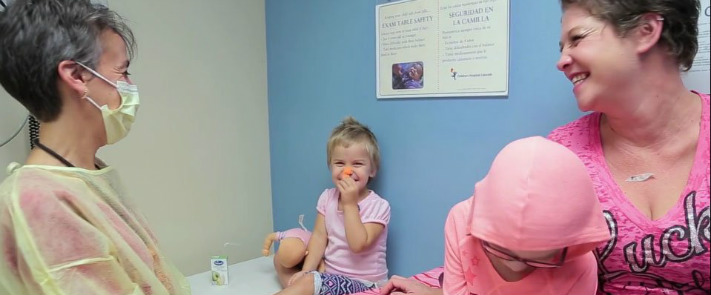Welcome to Hematology, Oncology and Bone Marrow Transplantation

The Department of Pediatrics Section of Hematology, Oncology and Bone Marrow Transplantation provides clinical services for
children, adolescents and young adults with cancer and non-malignant blood disorders at Children's Hospital Colorado Center for Cancer and Blood Disorders (CCBD).
- Our team also provides care in Children’s Hospital Colorado Network of Care sites.
- We provide outreach in many surrounding states, including Wyoming, Montana, Nebraska, Kansas, New Mexico, Utah and Arizona.
Leadership

Lia Gore MD
Professor of Pediatrics and Head, Section of Hematology, Oncology & Bone Marrow Transplantation
Co-Director, Developmental Therapeutics Program, University of Colorado Cancer Center
Children’s Hospital Colorado Center for Cancer and Blood Disorders (CCBD) Clinical Program occupies the entire 7th floor of Children’s Hospital Colorado. Facilities include a dedicated inpatient unit with adjacent outpatient clinic and infusion center. There are over 1,000 CCBD inpatient hospital admissions per year and more than 18,000 outpatient visits. The CCBD includes more than 30 MD faculty and midlevel members and is divided into several distinct programs.
The Pediatric Oncology Program provides care to children, adolescents, and young adults with cancer. We have dedicated subspecialty Pediatric Neuro-Oncology (brain tumors). The Brain tumor program was established in 1995 and is led by nationally and internationally known physicians. The Brain Tumor team includes doctors, nurse practitioners, physician assistants, nurses, pharmacists, psychologists, social workers, child life/therapeutic recreation specialists, dieticians, creative art therapist, case managers, schedulers and a family resource specialist. Each patient has a physician in charge of all treatment decisions, and a primary nurse assigned to oversee details of therapy. In addition to standard of care therapy the Neuro-Oncology program offers a wide variety of experimental therapy for hard to treat tumors and Orthopedic Oncology (bone tumor) Programs. The CCBD Experimental Therapeutics Program was established to promote the development and clinical testing of promising new therapies for the treatment of children, adolescents, and young adults with cancers that have not responded well to available treatments or have inadequate curative options. We also have an emphasis on survivorship that includes the H.O.P.E. (Helping Oncology Patients Excel) long-term follow-up clinic and TACTIC (Thriving After Cancer Treatment is Complete) clinic for adult cancer survivors.
The Pediatric Bone Marrow Transplant (BMT) and Cellular Therapy Program at Children's Hospital Colorado was established in 1993. Since that time, the Program has performed over 600 transplants and the team’s efforts have helped to shape the growing role of BMT in treating a variety of serious pediatric disorders. Diseases in which BMT can be used to provide curative treatment range from pediatric cancers to nonmalignant diseases of blood production such as aplastic anemia, thalassemia and sickle cell disease to inherited defects of the immune system and certain genetic disorders of metabolism such as Hurler's syndrome. The Program carries out all types of transplants using stem cells from both autologous (self) and allogeneic (donated; related or unrelated) sources. Technologies in place to utilize stem cells derived from marrow, peripheral blood and cord blood. Cellular therapies include the transfer of gene modified T cells (TCAR) and natural killer (NK) cell infusions. A selection of innovative clinical trials aimed at improving transplant outcomes and expanding diseases that may be helped with BMT are available to patients who wish to participate.
The Pediatric Hematology Program is responsible for the care of patients with primary noncancerous blood disorders, including hemophilia, coagulation disorders that produce excess bleeding or clotting, sickle cell disease, thalassemia, and a variety of other hematologic disorders. Major clinical components include the regional Hemophilia Center and state-funded Sickle Cell Disease Center. The Immuno-Hematology Clinic focuses on disorders of white blood cell function and how the immune system influences blood cell number and function.
Our faculty and staff are also involved with many groups and support programs such as hematology clinical research projects at the HTC and the main campus, as well as ASH (The American Society of Hematology), ASBMT (American Society for Blood and Marrow Transplantation), Butterfly Program, COG (Children’s Oncology Group), Hemophilia Camp, the HOPE Survivorship Program (Helping Oncology Patients Excel), ICON (ITP Consortium of North America), NAPAAC (North American Pediatric Aplastic Anemia Consortium), CHAT (Children’s Hospital-Acquired Thrombosis), Robbie's Friends, Teen and Young Adults support program, Sickle Cell Camp, Wilderness Program and YAPS (Youth and Pet Survivors Program). These groups and programs provide the Hematology, Oncology and Bone Marrow Transplantation faculty, patients and their families with support through camping program events and peer interaction. The faculty and staff involvement ranges from an advisory role to staffing of the various camps.
Residency
Pediatric residents rotate through the Hematology, Oncology/BMT inpatient services on a monthly basis. During that month, they receive training in the management of oncology patients and attend teaching conferences, both formal and informal, given by attending faculty regarding oncology issues.
Third-year residents are given the opportunity to rotate one month on the hematology outpatient/inpatient service. During the month, they will follow patients on the inpatient service, attend the Hemophilia, Thrombosis, Sickle Cell Clinic and general Hematology Clinics. Third-year residents also attend the teaching conferences given by the Section's faculty.
Fellowship
Our fellowship is designed as a three-year training program, with the emphasis in the latter two years being on research. The fellowship is accredited by the Accreditation Council of Graduate Medical Education. Please visit our fellowship page for further information.
Children’s Hospital Colorado Center for Cancer and Blood Disorders (CCBD) includes physician faculty members with a variety of interests in clinical, translational (“bench to bedside”), and laboratory research. Faculty members published over 200 scientific articles in the past five years and have grant funding from major national agencies including the National Institutes of Health, National Cancer Institute, American Cancer Society, Leukemia and Lymphoma Society, the Centers for Disease Control, and the Maternal and Child Health Bureau.
Major areas of clinical research focus include trials for children with all types of cancer, development of new cancer therapies, sickle cell disease, hemophilia and clotting disorders, methods of redirecting the immune system to cancer and studies of different modes of bone marrow transplantation.
Translational and basic laboratory research programs include studies of leukemia and brain tumor biology and genetics, development of new molecularly targeted therapies for various types of cancer, genetic studies of von Willebrand disease and other bleeding disorders, white blood cell development and function, immunotherapy with T cells and NK cells, methods to reduce graft vs. host disease and studies that seek to understand why reactions occur to blood transfusions.
The faculty members of the CCBD include internationally recognized leaders in research in hemophilia and clotting disorders, white blood cell function, transfusion reactions, brain tumors, experimental therapeutics, leukemia biology and treatment, and bone marrow transplant.
Some of our faculty have created websites for their research labs. To learn more, view the research labs directory .